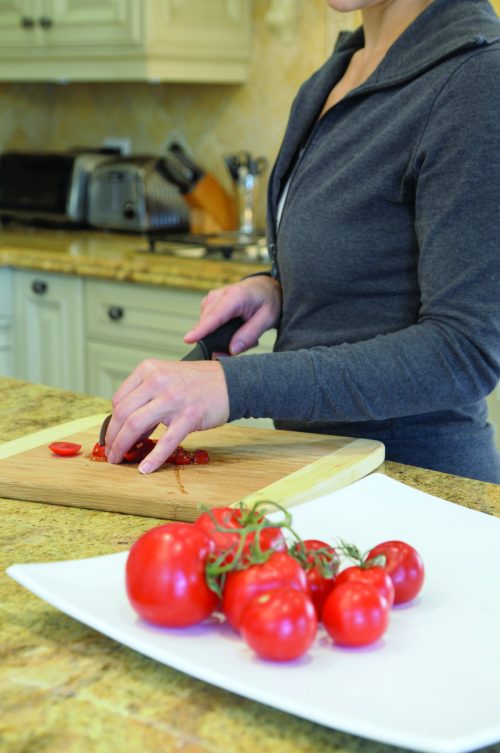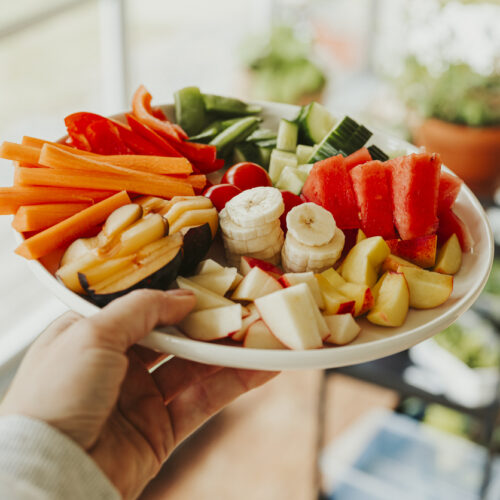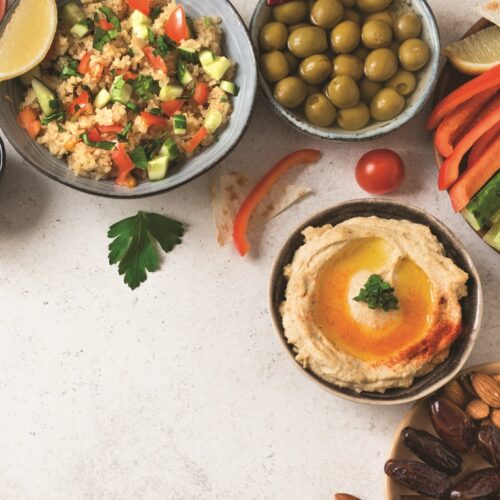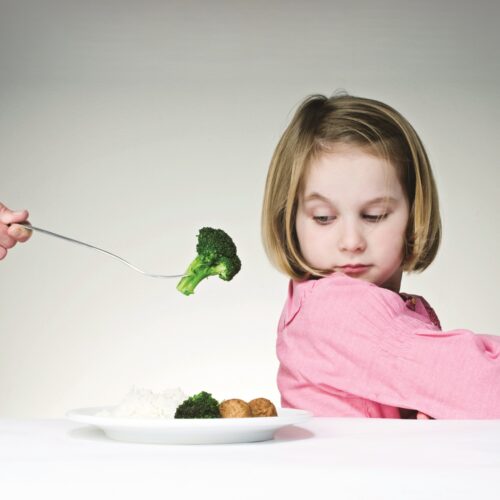
We all know there’s no one magic food or action that will prevent cancer. So the more small changes we can make the better. Cindy Williams has 10 healthy ideas to get you started.
1. Add a can of tomatoes or a generous spoonful of tomato paste to soups and casseroles
Tomatoes get their red colour from a carotenoid called lycopene. According to the 2007 World Cancer Research Fund and American Institute for Cancer Research report which considered all the studies conducted up to that time, lycopene probably reduces the risk of prostate cancer. Lycopene from tomatoes is more available and better absorbed by our body when tomatoes are cooked, crushed or eaten with fat such as olive oil.
2. Peel or chop garlic 10-15 minutes before cooking
When we chop garlic it allows an enzyme present in garlic cells called allinase to start a reaction that produces anti-cancer chemicals called allyl sulphides. If garlic is left for 10-15 minutes after chopping, the anti-cancer compounds will be retained during cooking. If garlic is cooked too soon, the enzyme won’t have had time to produce those compounds.
In animal studies and laboratory tests, the allyl sulphides found in garlic inhibit colon tumour formation. Garlic also has antibiotic properties which are thought to help protect against stomach cancer. The World Cancer Research Fund states that garlic probably protects against colorectal and stomach cancer.
3. Add two chunks of frozen spinach to your bolognese mixture
Dark-green leafy vegetables such as spinach and silver beet are rich in carotenoids and folate. Carotenoids reduce the risk of cancer of the mouth, pharynx, larynx, lung and oesophagus. Folate is essential for normal DNA functioning. It also helps make and repair DNA. Folate probably protects against pancreatic cancer.
4. Snack on one or two Brazil nuts each day
Brazil nuts are high in the mineral selenium. Eating just two Brazil nuts a day is as effective at increasing blood selenium levels as taking a supplement of 100 micrograms. Selenium is a powerful antioxidant which has been associated with less skin cancer and probably protects against prostate cancer, according to the World Cancer Research Fund.
In a study of 485 Australians, those with the highest selenium levels had almost 60 per cent less skin cancer tumours.
In a recent study, 39 men with prostate cancer took a selenium and vitamin E supplement for three to six weeks before having their prostate removed. The researchers found the selenium supplement had changed the gene expression of several pathways associated with cancer to make them more like non-cancerous cells.
Another study, however, looking at groups of people rather than cells in a laboratory, have not found a link between selenium and prostate cancer. It could be that the people they looked at already had a good selenium status.
Because New Zealand’s soil is deficient in selenium we are more likely to have lower blood levels of this mineral. So snacking on one or two Brazil nuts a day is a simple way to keep these levels up.
Selenium is toxic in high doses so don’t be tempted to think that if a little is good, more must be better.
5 . Drink a low-fat berry smoothie
Calcium, in particular from milk, probably protects against colorectal cancer and may reduce the risk of breast cancer.
It’s thought calcium works by enhancing DNA’s ability to repair itself. If this repair mechanism is disrupted, it may lead to cancer.
Berries are rich in cancer-fighting anthocyanins. Anthocyanins inhibit cancer growth and stimulate cancer cells to self destruct.
If you are a bloke, don’t go overboard on the calcium: large amounts may increase the risk of prostate cancer. Researchers studied around 27,000 men from the Singapore Chinese Health Study and found the higher their calcium intake the greater the risk of prostate cancer. What made this interesting was that most of the calcium came from non-dairy foods.
6. Swap the ham sandwich for chicken – choose chicken or vegetarian pizza over meat-lovers
If every meal contains red meat, it could be worth replacing a couple of them with meat-free meals.
Red meat and smoked or cured meats such as ham, bacon, sausages and salami have been linked to colorectal cancer. In a large European study (EPIC), those over 50 years old with the highest red and processed meat intakes had a 70 per cent higher risk of developing colorectal cancer compared with those with the lowest intake.
7. Go for a walk
There is convincing evidence that physical activity reduces the risk of colorectal cancer, and probably reduces the risk of endometrial cancer, and in post-menopausal women, the risk of breast cancer. A survey of 15,000 women found that exercise had a protective effect against breast cancer throughout their life provided they didn’t have a family history of breast cancer. One way exercise is thought to reduce risk is by reducing oestrogen levels. Lower oestrogen levels are thought to be protective against breast cancer.
8. Swap the barbecued or fried meat for a roast or casserole
Cooking meat at high temperatures increases the amount of heterocyclic amines (HCA). HCAs form when amino acids (from protein) and creatine (a chemical found in muscles) react at high cooking temperatures. Seventeen different HCAs that have been found in cooked meat may increase the risk of cancer. One study found that three times more HCAs were found in meat cooked at 250 degrees Celsius compared to meat cooked at 200°C.
A roast has less nasty HCAs than a well-cooked steak – but not if it’s served with gravy made from the meat drippings. Those burnt bits stuck at the base of the pan may taste good, but are not so good for your risk of cancer. Serve your roast meat with mustard, mint sauce or apple sauce.
9. Leave the tea bag in your green tea for five minutes
The polyphenols in tea act as strong antioxidants. Green tea has an especially active anti-cancer agent called EGCG. One study found that leaving the tea to infuse for five minutes released more than 80 per cent of the effective polyphenols. These substances are associated with a reduced risk of cancer of the breast, pancreas, colon, oesophagus and lung. It may also slow the growth of prostate cancer.
A study in Taiwan of about 500 people found that those who drank no green tea had five times more risk of lung cancer than those who drank one cup or more a day. The difference was even greater among smokers: those who drank no green tea had 12 times the risk of lung cancer compared to those who drank at least one cup of green tea a day.
Some researchers have suggested we need to drink seven or eight cups a day to absorb enough of the effective substances to make a difference.
10. Use raw cabbage for your coleslaw and stir-fry bok choy, cauliflower or broccoli
Cruciferous vegetables such as cabbage, broccoli, cauliflower and bok choy contain cancer-fighting isothiocyanates which may reduce the risk of bladder, lung and breast cancer. Just three or more servings a month of raw cruciferous vegetables may reduce bladder cancer risk by about 40 per cent. Make sure the vegetables are raw or lightly cooked. Cooking can destroy 60 to 90 per cent of the anti-cancer compounds.
In an animal study, raw cruciferous vegetables reduced bladder cancer by 40 per cent by increasing the number of enzymes which protect against oxidants and carcinogens in the bladder.
Another study of smokers found that eating raw cruciferous vegetables reduced the risk of some types of lung cancer.
Broccoli contains a substance called sulforaphane which inhibits breast cancer stem cells. Stem cells are cells within a tumour which fuel its growth. The less stem cells, the less cells with the potential to form tumours. When researchers injected sulforophane into mice it killed the breast cancer stem cells and prevented new tumours from growing.
www.healthyfood.com










